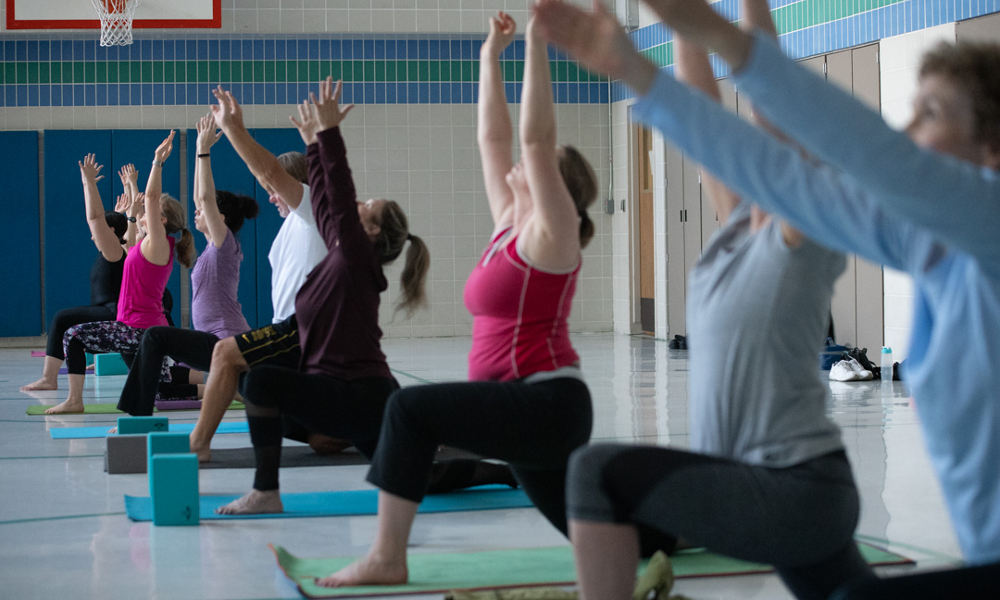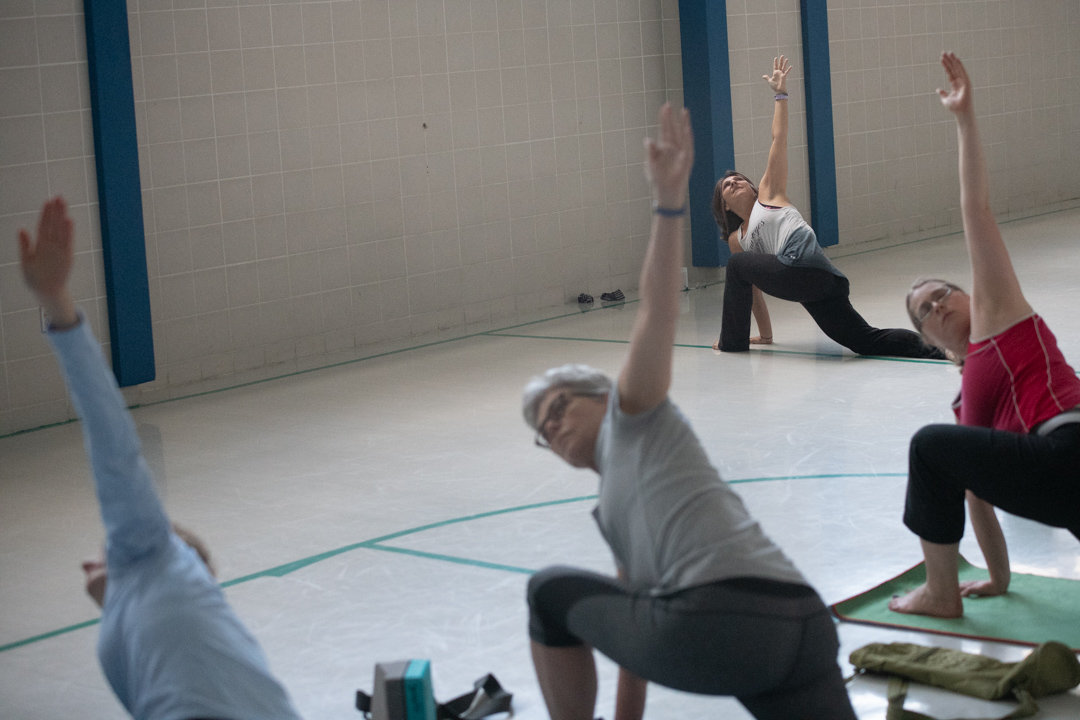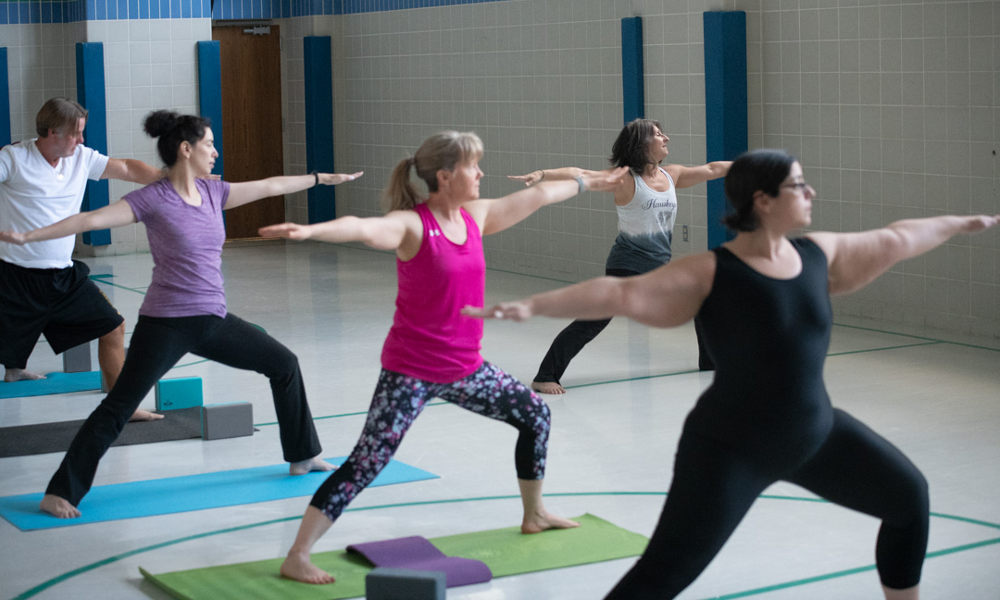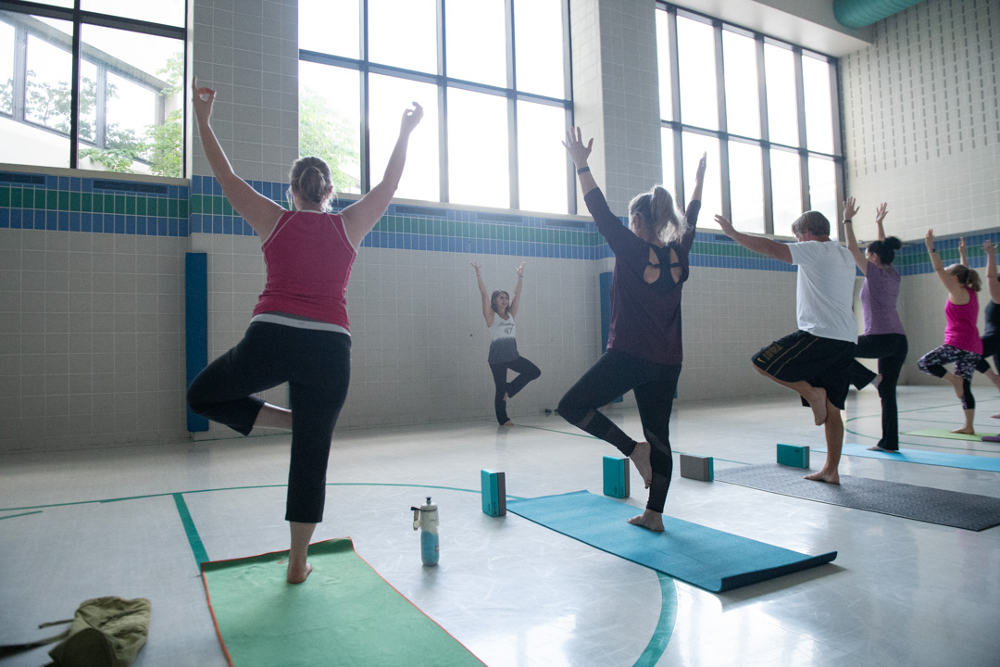University of Iowa Health Care embraces yoga for staff and patients

The medical community is finally starting to catch up to what yogis have known for over 5,000 years: Yoga can improve your health. The last decade has seen an increasing amount of peer reviewed research examining yoga and its benefits. Over 500 research papers have been published on yoga therapy, and a search done in 2016 in the National Library of Medicine electronic database, PubMed, found 138 relevant clinical trials on the use of yoga in cancer patients alone. A review of these 138 trials found that yoga could help to reduce anxiety, depression, fatigue and stress. Other research suggests that yoga may help with health issues such as hypertension, lower back pain, joint problems, asthma, epilepsy, irritable bowel syndrome, anxiety and depression.
With this research backing, physicians and hospitals have begun to accept yoga for its health value, and even recommend it to patients. As a result, yoga and wellness programs are opening up in hospitals around the United States. Some hospitals have added onsite wellness centers offering yoga and meditation while others have opened up classes for patients and staff in existing facilities.
University of Iowa Health Care (UIHC, formerly known as University of Iowa Hospitals and Clinics) is one of those centers using yoga and meditation to help cancer patients and staff improve their health and wellness. I spoke with two UIHC yoga teachers who are leading the way to better health through yoga.

In 2016, Denise Harder, RYT-200, had just finished her teacher training when she realized she wanted to bring the benefits of yoga to those who were too intimidated to go to a studio, or who believed that they could not do yoga. A University of Iowa employee, once Harder found out that UIHC had an activity gym available, she inquired about teaching yoga to UIHC staff.
“We started out small and eventually people started learning about it,” Harder said. “We have between 7-14 people and it has been a nice introduction for new yogis as well as intermediate yogis. The convenience of not having to worry about leaving work and driving someplace is nice.”
Since starting, the class has moved their way through a variety of poses including standing poses, inversions and twists and arm balances. Harder emphasizes the importance of Savasana in her classes.
“It can be a very difficult pose for people because it is hard to let everything go, especially their mind,” she said. “I encourage them to embrace this pose.”
They don’t feel as tense or as stressed, and now they even feel good that they can do things that they initially thought impossible. —Denise Harder
Harder said she sees the staff in her classes improving in their stress management; stress, she said, “can have devastating effects on the body and mind.” She loves to see when the UIHC staff “feel better about themselves, and that they notice a difference. They don’t feel as tense or as stressed, and now they even feel good that they can do things that they initially thought impossible. Success comes in all forms and I love watching them grow as a yogi and as a better, healthier version of themselves.”
Harder has big ideas and hopes for the future of yoga at UIHC, and as part of the larger healthcare system.
“Imagine if yoga were treated like a preventive healthcare check-up and covered by insurance! Wow!” she said. “Imagine the healthy bodies that would fill our world! With so many different types of yoga, everyone could benefit from one that fits their needs. I would like to see more studies on the benefits of yoga for preventive purposes as well as yoga therapy.”

Harder isn’t the only one at UIHC to view yoga as treatment.
Social worker Cynthia West has been involved with the Gentle Yoga Support Group at the Holden Comprehensive Cancer Center at UIHC since 2007. With the help of a grant, Dr. Geraldine Jacobson (previously a radiation oncologist at UIHC), Dr. Mark Karwal and Dr. George Weiner started the program when industry research began to show yoga’s benefits for cancer patients during and after treatment.
As the program grew, the yoga classes moved out of the hospital and to a more therapeutic location with the help of UI Recreational Services, where classes continue today.
One of the positive outcomes West has seen over the years has been the camaraderie members of the group receive from meeting other cancer patients. According to West, the students “will talk about the positive impact that this group has had on their ability to cope with their illness, including less fatigue and less anxiety (especially into survivorship).”
As the only National Cancer Institute (NCI) in the state of Iowa, the UI Holden Comprehensive Cancer Center has patients from all over Iowa and the surrounding states. Due to the spread-out nature of the cancer population, it may be difficult for some patients to come back to Iowa City to attend the Gentle Yoga Support Group sessions. Luckily, the Survivorship staff understand the need and encourage patients to participate in wellness programs in their areas, including at local YMCAs.
“In the next decade I think there will be increased focus on preventative medicine and I hope that this will include the impact that exercise can have on healthcare costs,” West said regarding the future of yoga at UIHC, and the larger healthcare system. “I would love to see more local communities offering yoga for cancer survivors and others with chronic illness. As cancer becomes more and more a chronic illness, it will be interesting to see what other research will show us about the impact of yoga on other patient populations.”

Bridget Toomey, RYT-200 teaches Kundalini Yoga at Heartland Yoga in Iowa City. Bridget is an Ovarian Cancer Research Alliance (OCRA) Advocate Leader and is a presenter in the OCRA Survivors Teaching Students program. She sits on the University of Iowa Holden Comprehensive Cancer Center Patient and Family Advisory Council as well as the Protocol Review and Monitoring Committee as a patient advocate. Bridget is a Project Manager at University of Iowa Hospitals and Clinics and is pursuing her master’s degree in healthcare management at Johns Hopkins University.


